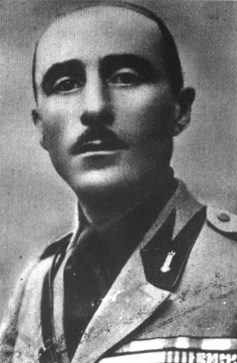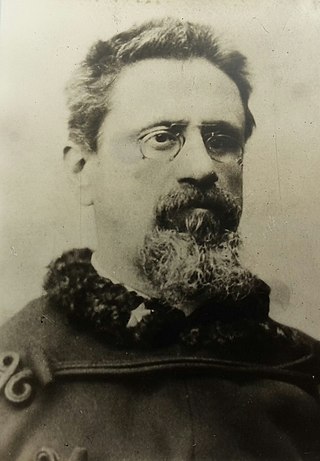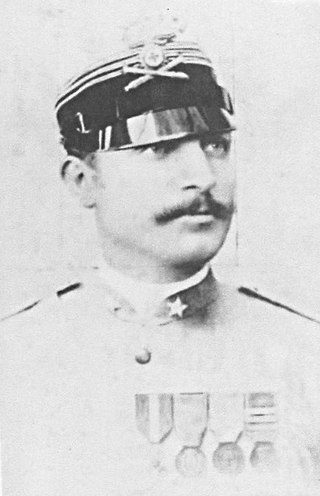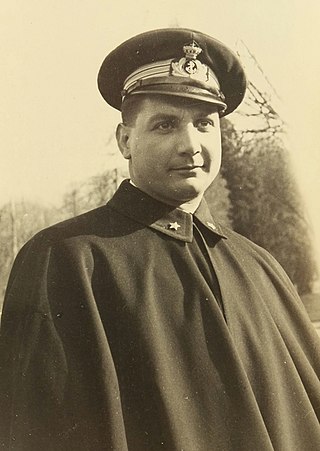
The Battle of Adwa was the climactic battle of the First Italo-Ethiopian War. The Ethiopian forces defeated the Italian invading force on Sunday 1 March 1896, near the town of Adwa. The decisive victory thwarted the campaign of the Kingdom of Italy to expand its colonial empire in the Horn of Africa. By the end of the 19th century, European powers had carved up almost all of Africa after the Berlin Conference; only Ethiopia and Liberia still maintained their independence. Adwa became a pre-eminent symbol of pan-Africanism and secured Ethiopian sovereignty until the Second Italo-Ethiopian War forty years later.

Giuseppe Galliano was an officer of the Royal Italian Army, mostly known for his role during the First Italo-Ethiopian War. He perished in the Battle of Adwa and was posthumously awarded the Gold Medal of Military Valour.

Giovanni Romero was an Italian colonel who participated in several conflicts during the 19th century. He participated in the Second Italian War of Independence and the Third Italian War of Independence, most notably leading the 4th Africa Infantry Regiment during the Battle of Adwa of the First Italo-Ethiopian War before being killed at the battle. Romero was also a posthumous recipient of the Gold Medal of Military Valour.

Giuseppe Edoardo Arimondi, OSML, OMS, OCI was an Italian general, mostly known for his role during the First Italo-Ethiopian War. He was one of the few European commanders who gained a victory over the Mahdists before Kitchener's Expedition, soundly defeating them at Agordat in 1893. After a long and successful colonial service, he died in combat at Adwa, and was posthumously awarded the Gold Medal of Military Valour.

Raffaele Aversa was an Italian soldier and Resistance member, most notable for having carried out the arrest of Benito Mussolini after his dismissal as Prime Minister of Italy on 25 July 1943.

Enrico Francisci was an Italian Blackshirt general during World War II.

Giovanni Esposito was an Italian general during World War II and a recipient of the Gold Medal of Military Valor. He commanded the 5th Alpine Division "Pusteria" in 1941–1942, and the territorial defense of Trieste from 1943 to 1945, joining the Italian Social Republic.

Vito Artale was an Italian general during World War II.
Augusto Ugolini was an officer in the Royal Italian Army during World War II, best known for his leadership during the battle of Culqualber, for which he was awarded the Gold Medal of Military Valor.

Vittorio Moccagatta was an Italian naval officer during World War II. He commanded the Decima Flottiglia MAS, the special operations unit of the Royal Italian Navy, from September 1940 until his death in action on 26 July 1941.

Domenico Turitto was an Italian major who was part of the Royal Colonial Corps of Eritrea. He participated in the Mahdist War as he commanded the 1st Indigenous Infantry Battalion, occupying the city of Kassala and distinguishing himself at the Battle of Kassala. During the First Italo-Ethiopian War, Turitto commanded the vanguard of the Indigenous brigade under the command of Matteo Albertone before being killed in the battle. He was also a recipient of the Silver and Bronze Medals of Military Valor and a knight of the Order of Saints Maurice and Lazarus.

Luigi Nava was an Italian General of the Army who participated in the First Italo-Ethiopian War and World War I. He participated in the Italian colonial campaign in the Horn of Africa which lead to his participation at the Battle of Adwa, where he was wounded and taken prisoner by the Abyssinians. Having become Lieutenant General, at the action of the general mobilization of 1915 he was appointed commander of the 4th Army but was dismissed from the command four months after Italy entered the war.

Cesare Airaghi was an Italian colonel and war hero who participated in several conflicts during the 19th century. Airaghi participated in the Second Italian War of Independence, the Third Italian War of Independence and the First Italo-Ethiopian War before being killed at the Battle of Adwa.

Edoardo Bianchini was an Italian captain of the First Italo-Ethiopian War. He commanded the 3rd Mountain Artillery Battery during the Battle of Adwa before being killed at the battle. He was also a posthumous recipient of the Gold Medal of Military Valor for his service at the battle.

Umberto Masotto (1864-1896) was an Italian Captain who served in the First Italo-Ethiopian War. He commanded the 4th Mountain Artillery Battery during the Battle of Adwa but was more famously known for being the first field gunner to receive the Gold Medal of Military Valour.

Trentino La Barba was an Italian soldier and Resistance fighter during World War II.

Alfeo Brandimarte was an Italian naval officer and Resistance member during World War II.

Leopoldo Cesare Prato was an Italian major of the First Italo-Ethiopian War. He commanded the 6th African Infantry Battalion during the Battle of Adwa before being killed in the battle. He was also a posthumous recipient of the Gold Medal of Military Valor for his service in the battle.

Giuseppe Antonio Baudoin was an Italian major of the Third Italian War of Independence and the First Italo-Ethiopian War. He commanded the 9th Africa Infantry Battalion during the Battle of Adwa before being killed in the battle. He was a posthumous recipient of the Gold Medal of Military Valour for his service in the battle.
Alfonso Torelli was an Italian General who was killed in a battle against Libyan rebels.



















